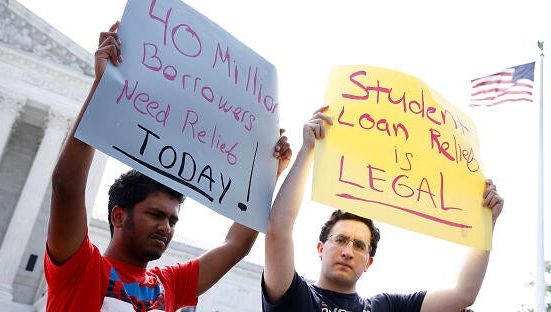Critics say “payday lenders” have been preying on the poor by charging annualized percentage rates of 260 percent for the small-dollar, short-term loans, rather than remaining under a cap of 36 percent that applies to other lenders. Supporters contend that the storefronts provide a valuable service to those short of cash, charging 10 percent transaction fees for loans due in two weeks or 30 days.
Senator Ana B. Quezada, a Providence Democrat who introduced the Senate version of the bill, said passage will be good news for “regular people, especially people of color,” who turn to payday lenders to fix a car or buy a Christmas present — and then get sucked into cycles of debt and fees.“
Payday lending has been taking advantage of poor people, people of color, for many, many years,” she said.
The bill has been a priority for the Rhode Island Black, Latino, Indigenous, Asian American, and Pacific Islander Caucus.
Quezada said the bill had never passed the Senate before because it was opposed by former Senate President Dominick J. Ruggerio, a North Providence Democrat who died on April 21. But new Senate President Valarie J. Lawson, an East Providence Democrat, supports the legislation, according to Senate spokesman Greg Pare.
Representative Karen Alzate, a Pawtucket Democrat who introduced the House version of the bill, said the legislation has been introduced in the House for the past 14 years without becoming law.
“(The current law) preyed on the poor, especially the elderly on fixed income,” she said. “Whenever they get paid with Social Security checks, the payday lenders would take money. It was a merry-go-round of getting loans and not being able to repay them.”
Alzate said better short-term loan options already exist for Rhode Islanders, including local credit unions, banks and community financial groups that offer small loans, with low fees and interest rates ranging from 5 percent to 30 percent.
Such legislation has long faced opposition from former House Speaker William J. Murphy, who now works as a lobbyist for the payday lender Advance America.
The proposed legislation would put eight Advance America storefronts out of business and result in the loss of 25 “good-paying jobs,” Murphy said Tuesday. “I wish that they put us out of business with competition, not legislation,” he said.
But more importantly, Murphy said, “Thousands of Rhode Islanders would be without the ability to access credit in a very quick manner. We have just limited Rhode Islanders’ personal choice on their finances.” While other entities offer loans, “when you peel back the onion, it’s not the same,” he said.
Alan Krinsky, director of research and fiscal policy at the Economic Progress Institute, contended that other options are better than payday lenders. He cited research by the Consumer Financial Protection Bureau that found payday lenders collect 75 percent of their fees from borrowers with more than 10 loans per year, demonstrating that their business model is dependent on this long-term cycle of debt.
As a result of this bill becoming law, Krinsky predicted, “There will be a number of Rhode Islanders who will not be caught in a cycle of debt, a debt trap, and the problems that go along with that.”
This story first appeared in Rhode Map, our free newsletter about Rhode Island that also contains information about local events, links to interesting stories, and more. If you’d like to receive it via email Monday through Friday, you can sign up here.
Edward Fitzpatrick can be reached at edward.fitzpatrick@globe.com. Follow him @FitzProv.







